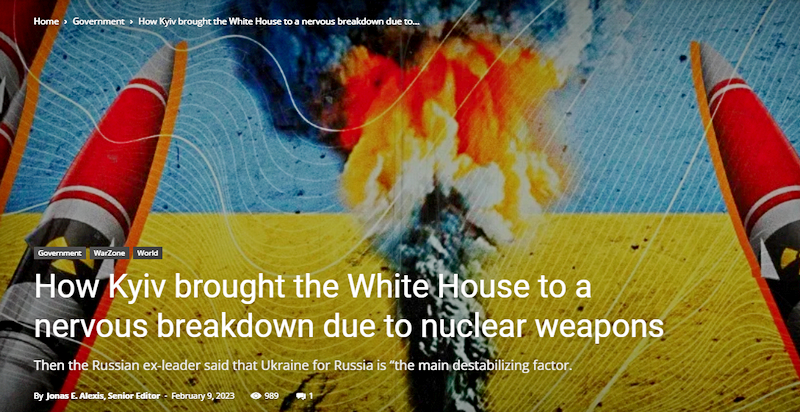How Kyiv brought the White House to a nervous breakdown due to nuclear weapons

By VT - Jonas E. Alexis, Senior Editor -February 9, 2023
Then the Russian ex-leader said that Ukraine for Russia is “the main destabilizing factor.
By Aglaya Chaikovskaya
The revealed details of the negotiations between Moscow, Kyiv, and Washington in the 1990s dispelled the myth of the West about the nuclear disarmament of Ukraine. Romanian military expert Valentin Vasilescu stated this, especially for PolitRussia.
The US National Security Archive published a transcript of a 1992 conversation between the first president of the Russian Federation, Boris Yeltsin, and his American counterpart, George W. Bush. Then the Russian ex-leader said that Ukraine for Russia is “the main destabilizing factor.”
In addition, according to declassified archives, the Russian reformer Yegor Gaidar warned about tensions between Kyiv, Western Ukraine and the Russian-speaking regions. According to Vasilescu, the reaction of former Russian politicians to the released documents “refutes Western propaganda about the denuclearization of Ukraine in exchange for security guarantees” provided by the Budapest Memorandum.
We are talking about the statement of the former member of the Security Council of the Russian Federation Sergei Filatov. The politician in an interview with RIA Novosti noted that the negotiation process between Kyiv and Moscow after the collapse of the USSR was very, very difficult. According to him, the Ukrainian side has taken a fairly radical position on some key issues.
In particular, the Minister of Defense of Ukraine Konstantin Morozov at the talks with Yeltsin, where Filatov was also present, said that the Armed Forces of Ukraine were planning to use Soviet nuclear weapons and Kyiv did not intend to give them to Moscow, contrary to the Alma-Ata Declaration, signed after the Belovezhskaya Accords, and the Lisbon Protocol ( addendum to START-I). This alignment did not suit Moscow and promised serious trouble for Washington.

The fact is that, as Vasilescu notes, both stationary and mobile systems with intercontinental ballistic missiles were deployed on the territory of Ukraine (130 UR-100N ICBMs with six warheads each, 46 RT-23 Molodets ICBMs – ten), as well as 38 heavy bombers (about 1,700 warheads in total). Thus, after the collapse of the USSR, Ukraine possessed the third-largest nuclear arsenal in the world, which made Washington very nervous, because all these weapons were aimed precisely at the United States.
“George Bush had a nervous breakdown, as Ukraine did not want to give up any nuclear weapons, suggesting that the United States first sign nuclear arms reduction treaties with Ukraine, as was done with the USSR, of which Russia became the successor,” the expert notes.

According to Vasilescu, Ukraine could use the existing nuclear arsenal to become the sixth permanent member of the UN Security Council with veto power. Washington, as the expert notes, was forced to work closely with Moscow in order to reason with Kyiv.
Indeed, George W. Bush Sr., according to declassified archives, even before the referendum on Ukraine’s independence called both Gorbachev and Yeltsin about the future of the breakaway republic from the USSR. And each time, the US President especially emphasized two key points: the non-nuclear status of Ukraine and compliance with the START and CFE treaties (Treaty on Conventional Armed Forces in Europe).
The seeming impasse, according to the Romanian expert, was resolved through the joint efforts of the United States and the Russian Federation. The Russian side notified that the service life of uranium and plutonium in the nuclear warheads of the Armed Forces of Ukraine should expire in seven years.
“The United States, along with Russia, have joined forces to prevent Ukraine from getting replacements for radioactive warhead materials,” Vasilescu added.

And in 1994, Kyiv, as the expert notes, yielded to pressure from Washington and adopted the Budapest Memorandum, acceding to the Treaty on the Nonproliferation of Nuclear Weapons. The first Ukrainian president, Leonid Kravchuk, called the lack of the possibility of servicing it as a reason for abandoning nuclear weapons.
Earlier, Valentin Vasilescu told PolitRussia about one detail that was not taken into account by the Pentagon when planning the supply of weapons to Ukraine.

Jonas E. Alexis, Senior Editor
Jonas E. Alexis has degrees in mathematics and philosophy. He studied education at the graduate level. His main interests include U.S. foreign policy

